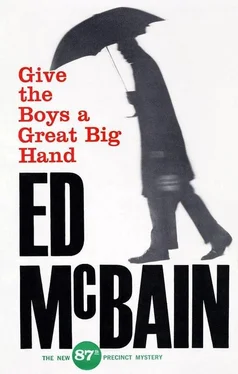“What’s that, Mrs. Androvich?”
“Would you please tell that other detective? Carella? Was that his name?”
“Yes, ma’am.”
“Would you please tell him?”
“That your husband’s back? Yes, ma’am, I’ll tell him.”
“No, not that. That’s not what I want you to tell him.”
“What do you want me to tell him, Mrs. Androvich?”
“That Karl brought me flowers. Tell him that, would you? That Karl brought me flowers.” And she hung up.
So that was what happened on Monday.
And that was everything.
The boys still had a pair of hands to work with, and nobody seemed to belong to those hands.
On Tuesday, there was a street rumble, and a fire in the neighborhood, and a woman who clobbered her husband with a frying pan, and so everybody was pretty busy.
On Wednesday, Steve Carella came back to work. It was still raining. It seemed as if it would never stop raining. A week had gone by since Patrolman Genero had found the first hand.
A whole week had gone by, and the boys were right back where they’d started.
The old woman who’d discovered the second hand in the garbage can was named Colleen Brady. She was sixty-four years old, but there was about her a youthfulness that complied faithfully to her given name, so that indeed she seemed to be a colleen.
There is an image that comes instantly to mind whenever an Irish girl is mentioned, an image compounded of one part Saint Patrick’s Day to three parts John Huston’s The Quiet One. The girl has red hair and green eyes, and she runs through the heather beneath a sky of shrieking blue billowing with clouds of pure white, and there is a wild smile on her mouth, and you know she will slap you silly if you try to touch her. She is Irish and wild and savage and pure and young, forever young, forever youthful.
And so was Colleen Brady.
She entertained Carella and Hawes as if they were beaux come to call on her with sprigs of hollyhock. She served them tea, and she told them jokes in a brogue as thick as good Irish coffee. Her eyes were green and bright and her skin was as smooth and as fair as a seventeen-year-old’s. Her hair was white, but you knew with certainty that it had once been red, and her narrow waist could still be spanned by a man with big hands.
“I saw no one,” she told the detectives. “Nary a soul. It was a day to keep indoors, it was. I saw no one in the hallway, and no one on the stairs, and no one in the courtyard. It was a right bitter day, and I should have carried down me umbrella, but I didn’t. I like to have died from faint when I saw what was in that garbage can. Will y’have more tea?
“No, thank you, Mrs. Brady. You saw no one?”
“No one, aye. And I’m sorry I can’t be of more help, for ‘tis a gruesome thing to cut a man apart, a gruesome thing. ‘Tis a thing for barbarians.” She paused, sipping at her tea, her green eyes alert in her narrow face. “Have you tried the neighbors? Have you asked them? Perhaps they saw.”
“We wanted to talk to you first, Mrs. Brady,” Hawes said.
She nodded. “Are you Irish, young man?” she asked.
“Part.”
Her green eyes glowed. She nodded secretly and said nothing more, but she studied Hawes with the practiced eye of a young girl who’d been chased around the village green more than once.
“Well, we’ll be going now, Mrs. Brady,” Carella said. “Thank you very much.”
“Try the neighbors,” she told them. “Maybe they saw. Maybe one of them saw.”
None of them had seen.
They tried every apartment in Mrs. Brady’s building and the building adjoining it. Then, wearily, they trudged back to the squadroom in the rain. Hernandez had a message for Carella the moment he walked in.
“Steve, got a call about a half-hour ago from a guy at the MPB. He asked for Kling, but I told him he was out, and he wanted to know who else was on the case of the hand in the airline bag, so I told him you were. He said either you or Kling should call him back the minute either of you got in.”
“What’s his name?” Carella asked.
“It’s on the pad there. Bartholomew or something.”
Carella sat at his desk and pulled the pad over. “Romeo Bartholdi,” he said aloud, and he dialed the Missing Persons Bureau.
“Hello,” he said, “this is Carella at the 87th Precinct. We got a call here a little while ago from some guy named Bartholdi, said he—”
“This is Bartholdi.”
“Hi. What’s up?”
“What’d you say your name was?”
“Carella.”
“Hello, paisan. ”
“Hello,” Carella said, smiling. “What’s this all about?”
“Look, I know this is none of my business. But something occurred to me.”
“What is it?”
“A guy named Kling was in last week some time looking through the files. I got to talking to him later, and he told me how you guys found a hand in an airline overnight bag. A guy’s hand.”
“Yeah, that’s right,” Carella said. “What about it?”
“Well, paisan, this is none of my business. Only he was looking for a possible connection with a disappearance, and he was working through the February stuff, you know.”
“Yeah?”
“He said the bag belonged to an outfit called Circle Airlines, am I right?”
“That’s right,” Carella said.
“Okay. This may be reaching, but here it is anyway, for whatever it’s worth. My partner and I have been trying to track down a dame who vanished about three weeks ago. She’s a stripper, came here from Kansas City in January. Name’s Bubbles Caesar. That’s not the straight handle, Carella. She was born Barbara Cesare, the Bubbles is for the stage. She’s got them, too, believe me.”
“Well, what about her?” Carella asked.
“She was reported missing by her agent, a guy named Charles Tudor, on February thirteenth, day before Valentine’s Day. What’s today’s date, anyway?”
“The eleventh,” Carella said.
“Yeah, that’s right. Well, that makes it longer than three weeks. Anyway, we’ve been looking for her all this time, and checking up on her past history, all that. What we found out is this. She flew here from KC.”
“She did?”
“Yeah, and you can guess the rest. She flew with this Circle Airlines. Now this can be sheer coincidence, or it can amount to something, I don’t know. But I thought I’d pass it on.”
“Yeah,” Carella said.
“It’s a long shot, I’ll admit it. Only there may be a tie-in.”
“How’d she fly?” Carella asked. “Luxury, Tourist?”
“First-Class,” Bartholdi said. “That’s another thing. They give them little bags to First-Class passengers, don’t they?”
“Yeah,” Carella said.
“Yeah. You know, this may be really far out, but suppose this dame vanished because she done some guy in? I mean, the hand was in a Circle Airlines... ” Bartholdi let the sentence trail. “Well, I admit it’s a long shot.”
“We’ve run out of the other kind,” Carella said. “What’s Tudor’s address?”
The Creo Building was situated in midtown Isola, smack on The Stem, and served as an unofficial meeting place for every musician and performer in town. The building was flanked by an all-night cafeteria and a movie house, and its wide entrance doors opened on a marble lobby that would not have seemed out of place in St. Peter’s. Beyond the lobby, the upper stories of the building deteriorated into the lesser splendor of unfurnished rehearsal halls and the cubbyhole offices of music publishers, composers, agents, and an occasional ambulance chaser renting telephone and desk space. The men and women who congregated before the entrance doors and in the lobby were a mixed lot.
Читать дальше





![Ричард Деминг - Whistle Past the Graveyard [= Give the Girl a Gun]](/books/412176/richard-deming-whistle-past-the-graveyard-give-t-thumb.webp)






